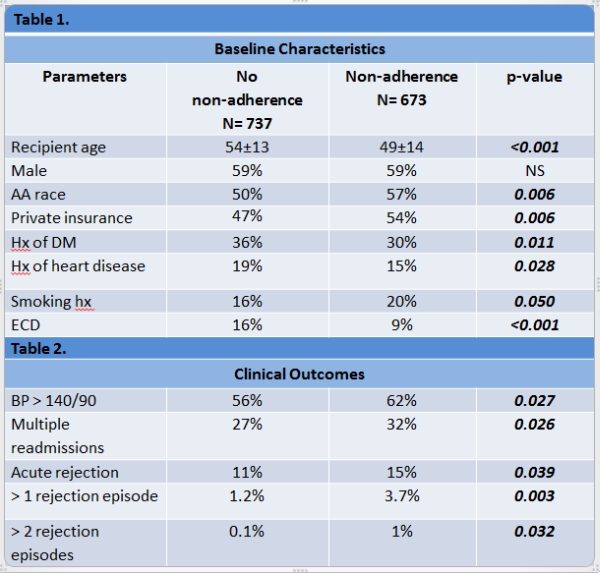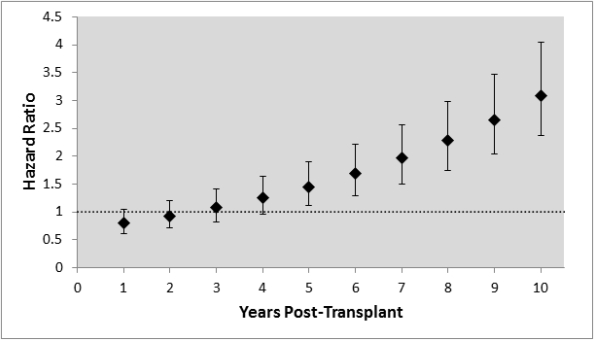Non-adherence is associated with increased risk of rejection and graft loss.
1Medicine, MUSC, Charleston, SC
2Surgery, MUSC, Charleston, SC.
Meeting: 2016 American Transplant Congress
Abstract number: 337
Keywords: Kidney transplantation, Outcome
Session Information
Session Name: Concurrent Session: Medication Errors, Variability and Adherence
Session Type: Concurrent Session
Date: Monday, June 13, 2016
Session Time: 4:30pm-6:00pm
 Presentation Time: 5:30pm-5:42pm
Presentation Time: 5:30pm-5:42pm
Location: Room 302
Non-adherence is common among kidney transplant recipients. However, data on the impact of appointment and medication non-adherence on kidney transplant outcomes are scarce. This study aims to assess the relationship of non-adherence to laboratory assessments, clinic appointments, and medication regimens with kidney transplant outcomes.
Methods: We analyzed kidney transplant recipients between 2005-2014 with a detailed review of the medical records to determine non-adherence and clinical outcomes. Baseline characteristics and outcomes were compared between two groups: patients with no documented non-adherence vs patients with documented non-adherence, using univariate and multivariate analyses.
Results: 1,410 kidney transplant recipients were included in this analysis: 737 with no documented non-adherence and 673 with documented non-adherence. Patients with documented non-adherence tend to be younger, African American, and have private insurance. Patients with no documented non-adherence tend to have a history of DM and heart disease, receive an ECD kidney, and have DGF. (Table 1). Non-adherence was associated with increased the risk of acute rejection (OR 1.4). This association was even more pronounced with subsequent rejection episodes: OR 3 and 7.7 respectively for second and third rejection episodes (Table 2). We also found a time-dependent association between non-adherence and graft loss (Fig. 1).


Conclusion: Non-adherence is common following kidney transplantation, particularly to laboratory assessments and clinic appointments. It is associated with increased risk of acute rejection and graft loss. Targeting patients with risk factors related with non-adherence and instituting measures to improve adherence may have a positive impact on transplant outcomes.
CITATION INFORMATION: Pullalarevu R, Taber D, Chokkalingam A, Browning R, Kamel M, Salazar M, Srinivas T, Posadas Salas M. Non-adherence is associated with increased risk of rejection and graft loss. Am J Transplant. 2016;16 (suppl 3).
To cite this abstract in AMA style:
Pullalarevu R, Taber D, Chokkalingam A, Browning R, Kamel M, Salazar M, Srinivas T, Salas MPosadas. Non-adherence is associated with increased risk of rejection and graft loss. [abstract]. Am J Transplant. 2016; 16 (suppl 3). https://atcmeetingabstracts.com/abstract/non-adherence-is-associated-with-increased-risk-of-rejection-and-graft-loss/. Accessed July 1, 2025.« Back to 2016 American Transplant Congress
